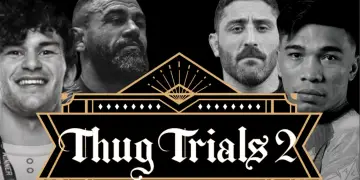Lex Fridman appeared on a podcast with Andrew Huberman recently and the topic of conversation turned to his journey through the BJJ belt system, so Fridman revealed which one he found the most difficult to earn. Fridman is an excellent podcast host in his own right, and he regularly conducts interviews with some of the top competitors and coaches in the combat sports world. The answer he gave might sound surprising at first, but Fridman took the time to break down how he felt in receiving each belt:
“For me, the black belt was the ceremonial belt. Which is not usually the case… Because, I fought the wars – like, I trained twice a day for I don’t know how many years – seven, eight years? I competed non-stop… I competed against people much better than me. I competed against many and beaten many black belts and brown belts.”
Although it’s not something that many experienced grapplers admit, his thoughts aren’t all that uncommon. As Lex Fridman explains, the levels of BJJ competition at brown and black belt are remarkably similar and you actually see this play out at the IBJJF world championship, where many competitors manage to win it at black belt immediately after being promoted:
“I think, for me personally, the hardest belt was the brown belt. Because, for people who know Jiu-Jitsu, the size of tournament division for blue belts and purple belts is just humongous. Like, when I competed at World’s, there was, like, 140 people in the division. Which means you have to win, I can’t remember how many times… Maybe seven, eight, nine times in a row to medal. And so, I just had to put in a lot of work during that time. And usually, competitions usually really make you earn a belt.”
Lex Fridman also echoed the thoughts of many competitors who approach the masters age bracket, as he explained why competing at the higher end of the BJJ belt spectrum was so much more difficult:
“So, to earn the purple belt was extremely difficult. Extremely difficult. And then, during the brown belt, that meant I had to compete non-stop against other purple belts – which are young. Like, the people that usually compete are like 23, 24, 25 year olds… That are, like, shredded, [that have] incredible cardio. They’re in [the period of their life when they have] no kids, no nothing – they can dedicate everything to this pursuit of their training. Two, three, times per day, their diet is on point… And for me, because they’re usually bigger and taller than me, usually more aggressive… Usually just good athletes. Yeah, I had to go through a lot of wars to earn that brown belt.”













